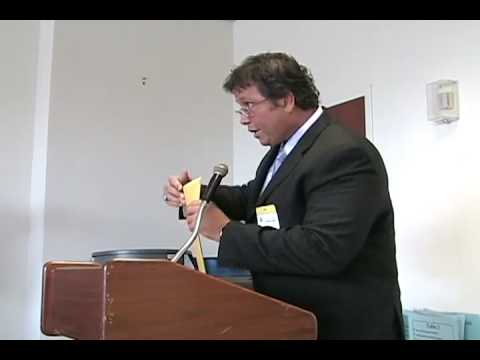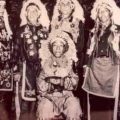
( – promoted by navajo)
On April 20, 2010, Chief Yonaguska Holloway of the New Jersey Sand Hill Band of Lenape and Cherokee Indians was invited to address the Assembly at the UN. I have been blogging about his case for the past two years. In February of 2009, Chief Holloway filed a lawsuit on behalf of his tribe because the State of New Jersey is trying to write them out of existence along with the Ani Tsalagi Onaselagi Northeastern Band (the oldest Cherokee tribe in NJ) and the federal judge appears to be stalling the case on purpose. The following is the entire text of Chief Holloway’s speech:
“Over sixty years ago, the General Assembly adopted and proclaimed the Universal Declaration of Human Rights. Afterward, the Country members were called upon to publicize the text of the Declaration and “to cause it to be disseminated, displayed, read, and expounded principally in schools and other educational institutions, without distinction based on the political status of countries or territories .” It is this very reason I stand here before you today. The violation of basic human rights as set forth in the Universal Declaration of Human Rights.
Over six hundred years ago, my ancestors lived and thrived along the shores of what is now the eastern seaboard of the United States of America. The New Jersey Sand Hill Band of Lenape and Cherokee Indians are the direct lineal descendants of the original inhabitants of the land now known as the State of New Jersey. Human remains, dating back almost two thousand years have been uncovered in this area. DNA testing of these remains has linked them to me personally.
We are a sovereign people, as were our ancestors at the time of the arrival of the first Europeans. First the Dutch, then later, the British. This is testified to by the fact that the early Europeans entered into and signed treaties with us, sovereign to sovereign. These treaties kept certain rights unto us, including land, water, hunting, fishing and coastal areas being amongst them. The United States, at the end of the Revolutionary War, as part of the agreement to end hostilities, agreed to honor and maintain these international treaties by accepting to act as a trustee. They even went as far as to enact federal legislation to ensure that our rights would be protected.
However, by 1802, the newly formed “State” of New Jersey had completely disregarded these treaties and federal laws, and most importantly, our basic human rights to even exist. Over the next few decades, in an unsolicited invasion, our ancestral lands were seized, our people forcibly removed or slaughtered. Those that survived were forced into hiding, in and around the lands that for millennium sustained us. Not only were federal laws completely ignored by New Jersey, but they had no legal right to even act as a state, as they had not ratified their own state constitution until 1842. All the while, the United States Federal Government turned a blind eye toward us, refusing to exercise their trust relationship with us that they had decades before accepted.
As the only remaining “First Contact” Indian people on the eastern seaboard to legally address this gross misconduct, the stakes are very high. We claim rights to the land and vast natural resources along the entire coastline of New Jersey, inland to the Delaware River. Our ancestral home for thousands of years include, what is now called Port Elizabeth, Newark, Atlantic City, and Trenton. Just to name a few. Also of importance is the fact that under these seized lands lies the largest fresh water quifer along the north east seaboard. Other “First Contact” tribes have settled their claims after decades of legal battles, but none have had the tremendous impact of ours.
After years of failed attempts to reconcile with the State of New Jersey, we were forced to take the state to Federal Court to prove our claim. Unfortunately, because of the magnitude and the implications of the case, it has been purposely stalled and ignored in an attempt to defraud us and dispense with our international treaty rights. We have even, in the course of the case, brought forth evidence that the State of New Jersey itself, in court, legal opinion and internal documents, admits that our lands have been seized illegally. Various major archaeologists, universities, historians and other specialists are in agreement as to our claim and rights.
It is not our intention to interfere with the continuity of the United State, or its national security. However, it is our intention to take every avenue available to us up to and including international intervention, and the World Court if necessary.
It is the very existence of our people that it at stake. And we have no intention of going into the night quietly! I stand here to ask the international community for its support, assistance in whatever manner available to assist us in having our International rights respected and restored.
It is our hope & prayer that this astute body and the global community will hear our long suppressed cry, and come to our aid!”
After Chief Yonaguska Holloway delivered his speech and the lunch break, U. S. Ambassador Susan Rice, in a moving speech, reiterated some of the points Chief Holloway had made earlier that day when he addressed the audience of Indigenous Leaders.
The ambassador announced that the U.S. is reconsidering its position on Indigenous Peoples’ Rights immediately on the heels of New Zealand’s reversal of its previous denial of the same rights. Australia, Canada, New Zealand and the United States refused to sign the United Nations Declaration on Rights of Indigenous Peoples. Australia and New Zealand reversed their decisions. The US and Canada are the only two countries left that have not reversed their position to guarantee the rights of indigenous peoples in their countries.
Ambassador Rice’s statement was met by a standing ovation by Chief Holloway’s Entourage, various Chiefs of the Iroquois Nations and other Indigenous Nations who were in attendance during the General Assembly of the United Nations.
For more information on the UN Forum on Indigenous People:
http://www.un.org/esa/socdev/u…
The Text of the Declaration:
http://iwgia.synkron.com/graph…
The timeline of the Sand Hill case against the State of New Jersey and documents involved in the case:
http://secretnj.net/2852/4501….
Here is the text of Ambassador Rice’s speech at the UN Permanent Forum on Indigenous Issues, April 20, 2010
“In his Presidential Proclamation last fall honoring Native American Heritage Month, President Obama recognized that the “indigenous peoples of North America–the First American–have woven rich and diverse threads into the tapestry of our Nation’s heritage.” What is true in the Americas is true around the world. There is no true history that does not take into account the story of indigenous populations–their proud traditions, their rich cultures, and their contributions to our shared heritage and identity.
But in the United States and many other parts of the world, indigenous communities continue to feel the heavy hand of history. Our first nations face serious challenges: disproportionate and dire poverty, unemployment, environmental degradation, health care gaps, violent crime, and bitter discrimination. Far more must be done–at home and abroad–to tackle these challenges, expand the circle of opportunity, and work with our Native communities to ensure they enjoy the security and dignity that all citizens deserve.
President Obama is deeply committed to strengthening and building on government-to-government relationships among the United States and our tribal governments. Our Administration has moved quickly to launch programs to improve the lives of Native Americans. Shortly after his inauguration, the President appointed my colleague, Kimberly Teehee, as his Native American policy advisor and began extensive outreach to tribal leaders. In November of last year, President Obama invited representatives from each of our 564 Indian tribes in the United States to attend a White House Tribal Nations Conference. Nearly 500 tribal leaders participated–the most widely attended White House tribal meeting with the President, Cabinet Secretaries, senior officials, and members of Congress in U.S. history. The President signed a Memorandum on November 5, 2009, directing every federal agency to develop plans to implement fully the Executive Order on “Consultation and Coordination with Tribal Governments,” which mandates that all agencies have an accountable process for meaningful and timely input by tribal officials in the development of regulatory policies that have tribal implications. The level of tribal consultation is now at historic levels–marking a new era in the United States’ relationship with tribal governments.
Last month, President Obama signed a historic reform of the U.S. health care system that includes important provisions to reduce the gaping health care disparities that Native Americans still face. Signing and implementing this landmark law constitutes a major step toward fulfilling our national responsibility to provide high-quality, affordable health care to all citizens, including American Indians and Alaska Natives.
The U.S. government has also made improving public safety in tribal communities a high priority. The Department of Justice supports an initiative to hire more Indian country Assistant U.S. Attorneys to prosecute cases of violent crime on Native lands. This initiative will also provide additional federal agents to support law-enforcement efforts in tribal communities. Combating crimes involving violence against women and children on Native lands is a particularly high priority for the U.S. government.
Last year, in the face of a global economic crisis, President Obama took swift action to spur economic activity and create new jobs. The American Recovery and Reinvestment Act specifically allocates more than $3 billion to assist tribal communities. These funds are being used to renovate schools on reservations across the country, to create new jobs in tribal economies, improve housing, support health care facilities, and bolster policing services. The President’s Fiscal Year 2011 budget request also proposes a 5 percent increase in federal funding for Native American programs, to a total of $18.5 billion.
The United States also supports programs that help indigenous communities around the world. We are especially committed to promoting corporate social responsibility, particularly with extractive industries whose operations can so dramatically affect the living conditions of indigenous peoples. The United States has therefore engaged in a multi-stakeholder initiative to encourage firms to operate safely within a framework that fully respects the rights of surrounding communities. We support the Initiative for Conservation in the Andean Amazon, a regional program designed to strengthen indigenous efforts to protect and conserve the Amazon Rainforest. In Peru, our common efforts focus on the conservation of the Manu National Parks, together with the Yanesha and Ashaninka peoples, by providing training in sustainable resource management and expanding environmental conservation capacity. The United States also participates fully and actively in the Arctic Council, a high-level intergovernmental forum of the eight Arctic states where Arctic indigenous peoples — represented by Permanent Participant organizations — have a co-equal role.
Consistent with President Obama’s call for a new era of U.S. engagement with the world, the United States applauds the Permanent Forum’s efforts to raise awareness of issues affecting the world’s indigenous peoples and to generate ideas for substantially improving their livelihoods and communities.
Thus today, I am pleased to announce that the United States has decided to review our position regarding the U.N. Declaration on the Rights of Indigenous Peoples. We recognize that, for many around the world, this Declaration provides a framework for addressing indigenous issues. During President Obama’s first year in office, tribal leaders encouraged the United States to reexamine its position on the Declaration–an important recommendation that directly complements our commitment to work together with the international community on the many challenges that indigenous peoples face. We will be conducting a formal review of the Declaration and the U.S. position on it. And as we move ahead, we look forward to consulting extensively with our valued and experienced colleagues in the federally recognized Indian tribes and interested nongovernmental organizations.
While many steps have been taken in the Administration’s first year, we are not satisfied. We seek to continue to work together with our partners in indigenous communities to provide security, prosperity, equality, and opportunity for all. There is no American history without Native American history. There can be no just and decent future for our nation that does not directly tackle the legacy of bitter discrimination and sorrow that the first Americans still live with. And America cannot be fully whole until its first inhabitants enjoy all the blessings of liberty, prosperity, and dignity. Let there be no doubt of our commitment. And we stand ready to be judged by the results. Thank you, Mr. Chairman.”


placed a huge portion below the fold. Thanks for your contribution.